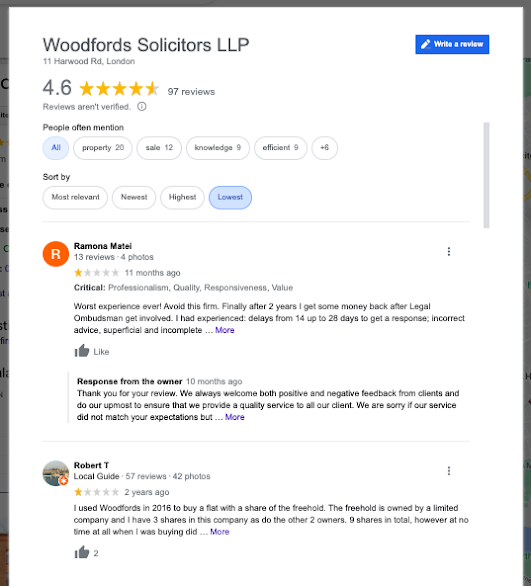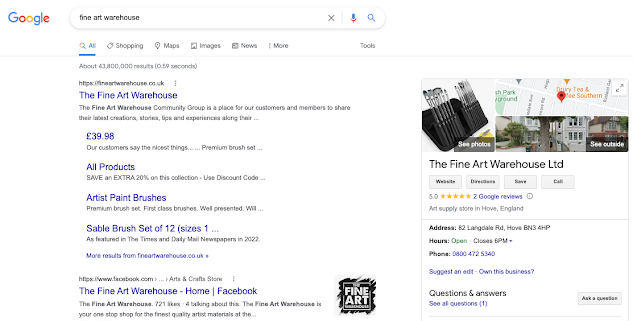The catastrophic human cost of lack of moderation at social media sites such as Instagram has made front page headlines in recent days. Our view - that all social media platforms, including review sites, should be made legally responsible for the content they publish - is well-known to our members and regular readers of this blog.
But what about businesses on the receiving end of fake, false, malicious or just plain inaccurate or misleading reviews? What is the real-world impact of these all too often seen reviews on businesses?
Sometimes we hear businesses say 'As long as we score 4.5 we're happy'. It's a natural response to something most businesses feel they have little control over. But this attitude denies the power of a single review to halt a business in its tracks, to stop the phones ringing or to see the clicks dry up, never mind unsettle existing loyal consumers when they see them as they are googling your business to find your phone number.
Let's look at what over ten years of fielding calls from seriously concerned business owners and managers has taught us...
1. A well-written 1* review will be read, and re-read, for months and years to come
This is what we call a 'killer review'; it is written by someone who is not disguising their identity, is a frequent Google reviewer and a trusted Google local guide; it makes believable statements about the business and their interactions with their customer. It will have lost the business enquiries and future business
That feeling you get when you first see that review - or are sent it by Google? That sinking feeling in the pit of your stomach? It's the reflection of the reaction of your potential customer: 'Oh dear! I'm not sure I want to use a business that even one customer has had such a negative experience of.'
Note the stress on well-written. You can discount rants - most consumers see through those these days.
2. Once a review is published the horse has bolted
A business's chances of getting Google remove a review are negligible (but see 'appeals' in 3. below and Google's own T&Cs here) unless the reviewer has contravened one of those T&Cs; such contravention does not cover criticism of the business, however misguided, unfair or just plain factually incorrect that may be.
It is therefore essential to have some mechanism in place to enable the business to respond to such reviews before they are published.
3. 1* reviews are always read first, no matter the business's overall score
The business can be scoring 4.9, but if that one negative review is written convincingly it will lose the business significant amounts of enquiries.
What can the business do? It can appeal to Google to have it taken down, as long as it contravenes their terms of service (we draft appeals on behalf of clients all the time) and it must respond to the review. Not with a 'never heard of you...' but addressing all the points made in the review, however unfair or inaccurate they may be, calmly and coherently. And sign off with a name, not 'customer services'. You will never convince that kind of reviewer to change their review or take it down, so your response is aimed solely at readers of the review.
4. 1* reviews, providing they are not obvious rants, are believed by consumers
It is tempting to say 'we run a great business and all our other reviews confirm that' but leave a well-written one-star review unaddressed and it will hurt your inbound enquiries - for the foreseeable future (a one star review written five years ago, if it is one of a few, will still be being read today).
5. The higher-value the service the business is offering the more diligently the 1* reviews will be read.
We estimate that all the one star reviews - within reason, but certainly up to half-a-dozen - of the following services will be read by a potential customer/client/patient...
- financial services, investment management, accounting
- business services - such as employment agencies, PR and marketing consultants
- high-value transactional businesses - such as estate agency
all of which involve transactions with at least £4 zeros on the end, not to mention 5 or 6.
Put yourself in the position of...
- someone investing a sizeable lump sum
- someone with a life threatening medical issue
- someone looking for a family lawyer for the first time
- someone considering moving from one advertising agency to another
- someone looking for the best local estate agent to sell their major family asset
...and we're sure you will agree that spending a few minutes reading reviews is the very least they will do, even if the business has already been personally recommended or has the best marketing on the planet.
The solution
All of the above are the reasons why our clients value our moderation so highly. By moderating every single review written through our clients' websites we can ensure that the accuracy and relevance of each and every review is of the highest order. Moderation cannot absolutely guarantee that no rogue reviews will ever be published - that would be against the CMA regulations which categorically protect the consumers' right to have their opinion published - but we estimate (and we have over ten years' experience to back up this contention) that our moderation resolves the issues contained in over 95 percent of such reviews before they see the light of day.
Of course consumers can always write a review direct to Google, but by inviting them to write a review through your website you will succeed, far more often than not, in channelling their review in that direction, and therefore benefitting from our moderation. You will also have the moral upper hand when responding to those reviews which still go direct to Google: 'We did invite you to post a review...and we would have been able to resolve [whatever issue the review raises] at that point if you had accepted our invitation.'
The fact that the overwhelming majority of such contentious reviews are, by definition and by their very nature, one or two-star also enables us to accurately estimate that HelpHound's moderation increases the average client's Google score by between 0.2 and 0.5 - so from, say, 4.3 to 4.7 or 4.8. That in itself will ensure the business rises up the rankings in local search.
Think of moderation as an insurance policy: it protects your business's hard-won reputation against damage - its as simple as that.
Further reading





















